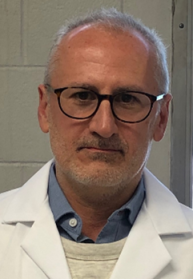 Andrea Morrione, Ph.D.
Andrea Morrione, Ph.D.
Professor (Research)
Deputy Director, Sbarro Institute for Cancer Research and Molecular Medicine and Center for Biotechnology
Director of the Molecular Mechanisms of Cancer Signal Transduction Program
Andrea.Morrione@temple.edu
Molecular Mechanisms of Cancer Signal Transduction Program
Our research group is focused on the characterization of the molecular mechanism of action and regulation of cancer cell signaling with particular emphasis on progranulin function in solid tumors, including bladder and mesothelioma. We demonstrated that the growth factor progranulin plays a critical role in bladder cancer by modulating tumor cell motility and invasion. Progranulin regulates actin remodeling by interacting with drebrin, an actin binding protein that regulates tumor growth. We also discovered that progranulin depletion inhibits epithelial-to-mesenchymal transition and reduces in vivo tumor growth. Moreover, progranulin depletion sensitizes urothelial cancer cells to cisplatin treatment. Until recently, the progranulin signaling receptor remained unidentified, precluding a full understanding of progranulin action in tumor cell biology. We recently identified EphA2, a member of a large family of receptor tyrosine-kinases, as the functional receptor for progranulin. Progranulin evoked Akt- and Erk1/2-mediated EphA2 phosphorylation at Ser897, which could drive bladder tumorigenesis. In addition, EphA2 depletion severely blunted progranulin-dependent motility and anchorage-independent growth, and sensitized bladder cancer cells to cisplatin treatment. The discovery of EphA2 as the functional signaling receptor for progranulin and the identification of novel downstream effectors offer a new avenue for understanding the underlying mechanism of progranulin action and may constitute novel clinical and therapeutic targets not only in bladder cancer but also in mesothelioma, where we have evidence supporting a critical role for the progranulin oncogenic axis in this rare and aggressive neoplasia. However, in mesothelioma EphA2 is not the functional receptor and progranulin activates a network of RTKs including EGFR and RYK.
Additional projects are aimed at the functional characterization of the tumor suppressor p107 and the mechanisms regulating its stability.
The program is also now incorporating some of the projects of the former Obesity and Cancer Program, on special emphasis on the role of the IGF-IR and progranulin in obesity and cancer.
Specific Research Projects
- Molecular characterization of the progranulin/EphA2 signaling axis in bladder cancer and mesothelioma.
- Mutagenic analysis of EphA2 to dissect the residues necessary for oncogenic signaling.
- Role of EGFR and RYK in regulating progranulin action in mesothelioma.
- Dissection of p107 mechanisms of action and regulation.
- Characterization of progranulin-evoked ubiquitination and trafficking of EphA2 and its relevance in modulating receptor oncogenic signals.
- Identification of novel p107- and p130-interacting proteins by proteomic approaches.
- IGF-IR and progranulin role in obesity.
Andrea Morrione Bio
After his studies in Biochemistry at Universita’ degli Studi di Milano, Milan Italy, Dr. Morrione moved to USA in 1993 and has been working in the field of cancer biology since his postdoctoral training at the Kimmel Cancer Institute, Thomas Jefferson University, Philadelphia, PA in the laboratory of Dr. Renato Baserga, one of the leading experts in IGF-IR oncogenic signaling. In 1997 Dr. Morrione joined the Faculty of Thomas Jefferson University in the Department of Microbiology. In 2002 after receiving an NIH/NIDDK Career Development Award Dr. Morrione joined the Department of Urology at Jefferson where from 2008 to 2018 serves as the Director for Urology Basic Science and Associate Professor. Dr. Morrione joined the Department of Biology and the Sbarro Institute for Cancer Research and Molecular Medicine as Associate Professor of Research, and he is currently Professor of Research and Deputy Director of the Sbarro Institute for Cancer Research and Molecular Medicine and Center for Biotechnology
Dr. Morrione has made several important discoveries in determining the role of growth factor receptors in transformation. He is the author of 88 peer-reviewed publications and book chapters and serves as a member of numerous editorial boards of high impact factor journals, including Matrix Biology, Cancers and Frontiers in Endocrinology (Cancer Endocrinology).
In recent years Dr. Morrione built an NIH funded program in the investigation of growth factor signaling (progranulin) in bladder cancer. Additional research programs focus on the role of tumor suppressors of the RB family in various tumor models.
As expert in cancer cell signaling, he has served on several organizing committees, chaired sessions and presented his work at numerous international meetings. Dr. Morrione has acted as expert reviewer on Study Sections for NIH, the American Urological Association (AUA) and BCAN (Bladder Cancer Advocacy Network) and serves as expert reviewer for numerous funding agencies including The Research Grants Council (RGC) of Hong Kong, AIRC (Associazione Italiana Ricerca sul Cancro), Breast Cancer Campaign, UK, Genome British Columbia and Diabetes, UK.